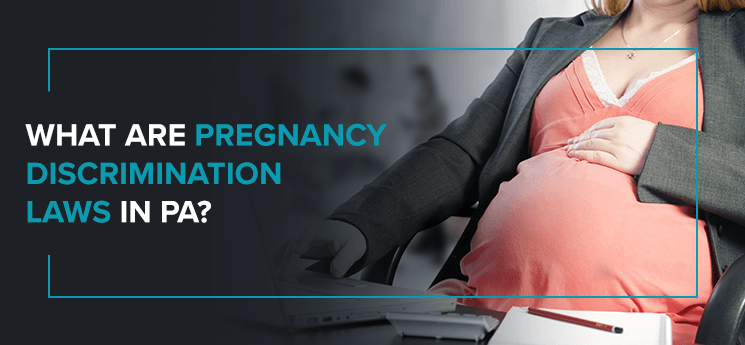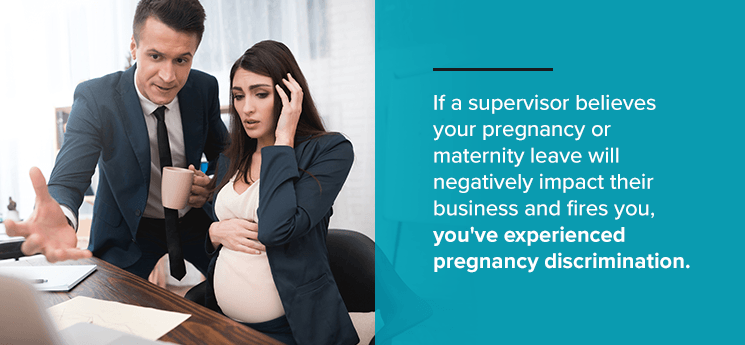Pregnancy comes with a lot of challenges and a lot of joys. Discrimination in the workplace should not be something that overshadows an already very emotional time in life.
Pregnancy discrimination can come in a variety of forms, and knowing all of them will help ensure your protection from discriminatory actions. Sometimes discrimination can be blatantly obvious, while other times, it is more subtle and hard to discern. However, there are federal and state laws working to protect you from discrimination based on pregnancy, childbirth or medical conditions caused by either one.
What Is Pregnancy Discrimination?
Pregnancy discrimination is the poor treatment of a female applicant or employee due to pregnancy, childbirth or a medical condition caused by pregnancy or childbirth. In pregnancy discrimination situations, women are often discriminated against by their supervisor, a co-worker or sometimes even a client or customer.
The law protects applicants and employees from pregnancy discrimination. Compared to other employment laws, pregnancy discrimination is just as hard to detect, but certain areas have more evident signs.
The Pregnancy Discrimination Act (PDA) protects women in the workplace. The act — an amendment to Title VII of the Civil Rights Act of 1964 — states that women cannot be discriminated against on the basis of pregnancy, childbirth or medical conditions caused by either. Employers must treat them as fellow employees in a similar state of health.
Forms of Pregnancy Discrimination
Pregnancy discrimination in the workplace can come in a lot of different forms. Some are easy to see, while some are not necessarily well-known rights.
Maternity Leave Discrimination
Maternity leave discrimination is a form of pregnancy discrimination. Under a federal law called the Family and Medical Leave Act, certain employees are covered to take unpaid but job-protected leave. This includes 12 workweeks following a child’s birth or the adoption or fostering of a new child. This act also covers other forms of familial health needs so employees have the ability to care for their loved ones.
When a woman has a baby, the natural next step is maternity leave from work. She should not be punished for the time she takes off but rather encouraged to spend time caring for herself and her new child. An employee is protected if an employer doesn’t grant maternity leave or fires her while on leave.
Space to Pump
Employers with more than 50 employees must provide nursing mothers a private space that is not a restroom as well as a reasonable amount of break time to pump breast milk. This must be available to mothers for one year after their child’s birth.
This does not apply to small businesses if providing the space would cause undue hardship. Employers are not required to pay nursing mothers for the time spent pumping, but they must allow them to use their normal break time to pump if they desire.
Temporary Disability
Pregnancy can come with a lot of health complications. If a woman is unable to continue working due to a medical condition caused by pregnancy, she must be treated as any other employee with a temporary disability. The Americans with Disabilities Act (ADA) requires employers to provide reasonable accommodation to employees with disabilities, even if the disability is temporary. This includes protection from discrimination in any aspect of employment, including hiring, firing, job assignments, training, benefits and pay.
The reasonable accommodation employers must provide include any change in the work environment or how things are done to help the person perform the job duties to the same degree as their nondisabled co-workers.
The exception is if the employer can prove that providing reasonable accommodation would cause undue hardship. This could look like the accommodation being too expensive or difficult when taking into account the business’ size and resources. The employee and employer can have a back-and-forth discussion about what a reasonable accommodation would look like to try and avoid this.
Termination Due to Pregnancy
If a supervisor believes your pregnancy or maternity leave will negatively impact their business and fires you, you’ve experienced pregnancy discrimination. Even if they believe they are protecting you by keeping you from performing physical tasks required of you by your job, that is not their decision to make and is illegal under federal law.
Failing to Hire
Pregnancy discrimination also includes when a supervisor doesn’t hire you because you are pregnant or when they do not hire you after they ask about your plans for a family, and you answer that you are planning to have kids. Questions about your family plans in the interview process are usually illegal, and you are not required to answer them.
PA Pregnancy Discrimination Laws
Knowing what discrimination against pregnancy is will help you know when to get legal help. The federal laws you are protected by have been covered, but there are also state laws in Pennsylvania that protect you further.
The Pennsylvania Human Relations Act
The Pennsylvania Human Relations Act (PHRA) protects people from discrimination in housing, commercial property, education and public and employment settings. The PHRA provides employees with an added level of protection at the state level against pregnancy discrimination. It is similar to the FMLA but applies to companies with four or more employees and does not have a restriction on how long employees need to have worked at the company before they are protected.
Damages in a Pregnancy Discrimination Claim
As with most other employment law claims, a victim of discrimination has rights to certain damages depending on the circumstances of their specific case. For pregnancy discrimination, damages may include monetary compensation and equitable relief. Specifically, compensation can include the following:
- Compensation for financial losses
- Punitive damages
- Compensation for out-of-pocket legal expenses
- Recovery from physical and emotional distress
- Liquidated damages
- Employment following wrongful termination



